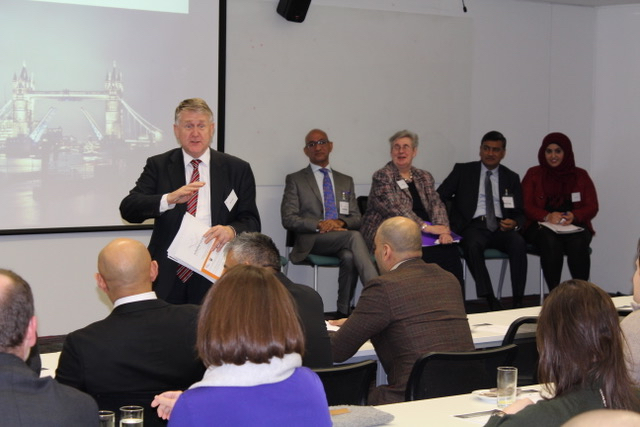Reflections from London & Beyond: bridging cultures to build stronger communities
On January 19th 2017, Dr Yunus Sola led a Breakfast Roundtable discussion on ‘The Role of Philanthropy in Bridging Cultures to Build Stronger Communities’ in London. Panelists included Mark Fisher, Director, Office for Civil Society and Innovation, Cabinet Office; Dr Tariq Cheema, Philanthropist and President of the World Congress of Muslim Philanthropists; and Cllr Saima Ashraf, Councillor, London Borough of Barking and Dagenham. Here, he summarises some of the key questions that arose from the event.
Anthony Tomei CBE wrote in a previous blog, ‘Philanthropy can be an individual or an institutional enterprise. It can take different forms at different times and in different places. Its outcomes can be good or bad, as can its motivations.’ Anthony’s words encapsulate the intricacy in attempting to make sense of, and overlay philanthropy with, community building. They provide a good place to begin this blog.
At the very heart of philanthropy is meeting the needs of communities and the individuals within a community. But community building is both complex and a rapidly changing landscape. Each generation has a different expectation of the self, the community they belong to; with ever growing access to long distance and international opportunities, communities are growing and responding in different ways. How does the new transiency, increased access to education, an intricate social media and shifts in the values associated with a new mix of cultures, nationalities, and awareness of genders, social justice and equality impact the expectations and needs of a community? How does philanthropy and social investment address these needs, while repairing the breakages, and enriching and strengthening community? These questions provided the starting point for the morning’s panelists and subsequent roundtable discussions. With attendees having travelled from Europe, the Middle East, the USA and Canada, an array of views and perspectives was present and the roundtable highlighted a number of themes, including:
- What is the role of Philanthropy and Social investment for Community Building, Social Action and a Social Economy?
- How can/how does Early Education play a part in community building?
- Community values. How does “values sharing” take place?
- What is “Community”?
- The hidden politics of philanthropy and social investment. What are the motivations of, say, corporate philanthropy?
- Is the word ‘Philanthropy’ a solo elitist term, and therefore both a contradiction and damaging to community building?
- How does Community Building address community identity versus personal identity? Community needs versus individual needs?
- What role should philanthropy and social investment play in empowering a community?
- What is the balance between philanthropy/investment and the role of dialogue for change in building community?
- What factors identify the quality of philanthropic giving that impact better community building?
- Does Philanthropy for Community Building need the concept of lasting change?
- Is philanthropy in community building scattered, fragmented and lacking in introspection?
- How does Philanthropy need to change to better Community Building?
- How and where is accountability in philanthropy and social investment for community building managed and to whom is it reported?
- What role and responsibility does the community take for its own investment in community building? Examples were given from Barking and Dagenham.
- Leaders, social investors and philanthropists have been battling to build communities for centuries and over millenniums. So what is different now?
On the one hand, the current movement of refugees, the Brexit vote and various international political transformations appear to have refocused attention to the word “Community” around the world. More interesting is a new reality. The ever changing shifts in culture, new realisations of social justice and equality and more instant modes of communication are driving expectations to higher standards for a social economy.
So are social investors, government, philanthropists keeping up with the new dynamics of community needs? Does the funding support better equipped and more empowered communities or does the funding support a status quo, secondary agendas, or even defunct ideologies?
Who has the responsibility to identify the needs and gaps and breakages within a community and to invite investment for change? What is the role of government and philanthropy in encouraging this responsibility? What are the motivations for community intervention? Votes, corporate public relations, marketing? What are the motivations of community leaders and culture/religious leaders for seeking investment and change? Are the individuals in a community ready for change and challenging prejudice, whose values/agenda are they following?
While the roundtable thus raised more questions than answers, it highlighted the need for renewed and more in-depth discussions of these issues across a wider set of stakeholders. It also brought together key potential partners for a practical, tangible dialogue on strengthening communities and to question the role and responsibility that the community, social investors and philanthropists need to play in that partnership. The table has been set for the next discussion, and I suspect that for some, the dialogue will be unsettling.
Dr Yunus Sola is Director of the Academy of Philanthropy; Programme Director, Global Donors Forum; Associate, St Andrews University, The Centre for the Study of Philanthropy & Public Good; UN Advisor, Trainer and Mentor, Entrepreneurs for Social Change.
The event formed part of the ESRC Seminar Series ‘Philanthropy to the Rescue: Exploring the opportunities, strengths and challenges of philanthropy‘ and was co-organised by the Centre for the Study of Philanthropy & Public Good, the Academy of Philanthropy and Cass Business School’s Centre for Charitable Giving and Philanthropy (CGAP).
